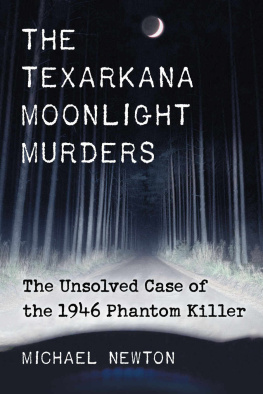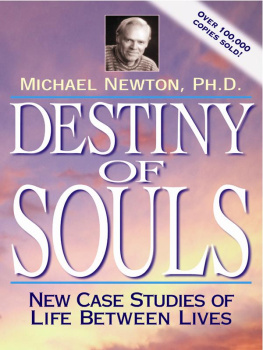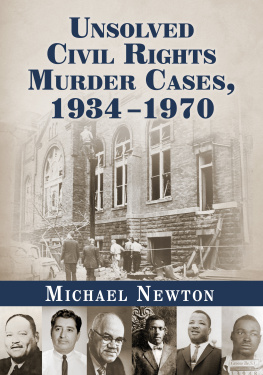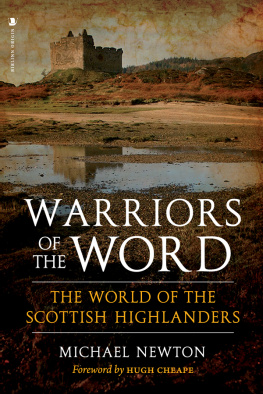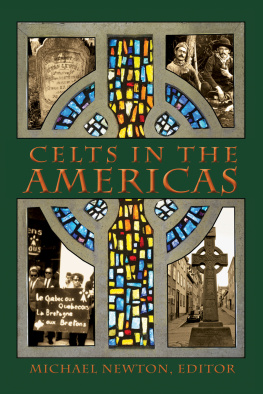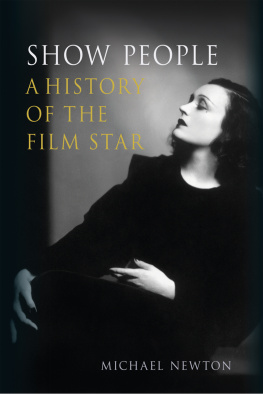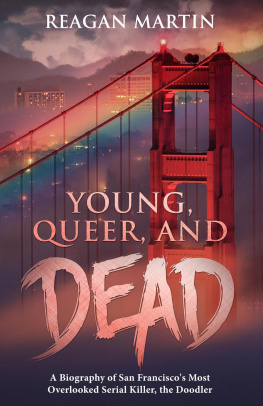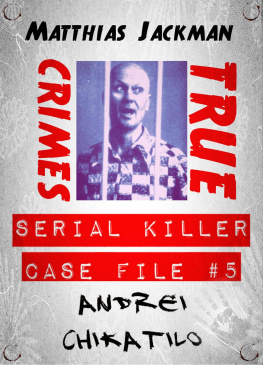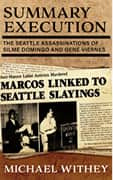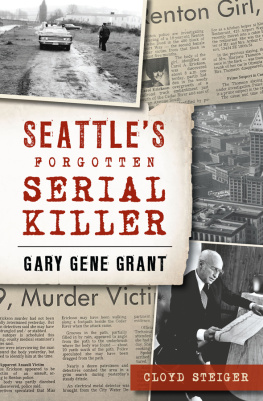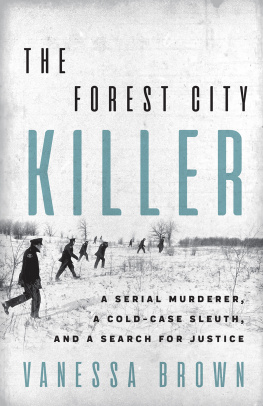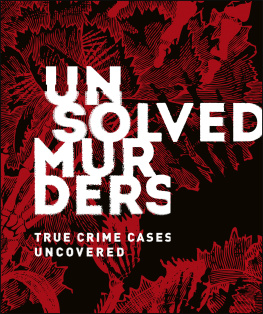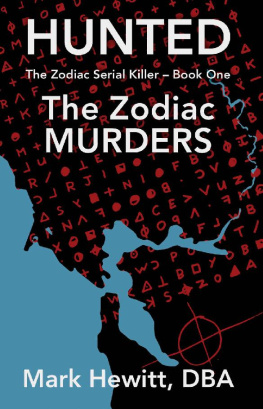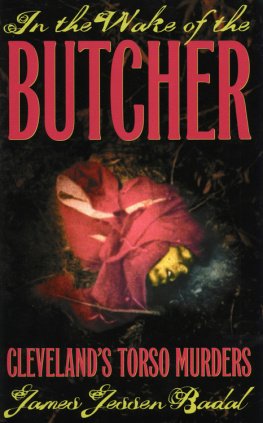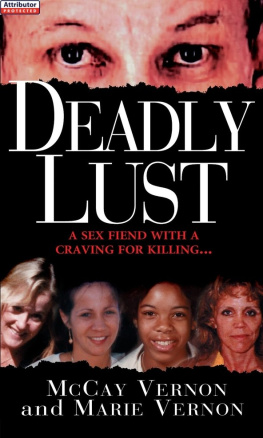Also by MICHAEL NEWTON AND FROM MCFARLAND
The FBI Encyclopedia (2003; paper 2012)
The Mafia at Apalachin, 1957 (2012)
Chronology of Organized Crime Worldwide, 6000 B.C.E. to 2010 (2011)
The Ku Klux Klan in Mississippi: A History (2010)
The FBI and the KKK: A Critical History (2005; paper 2009)
Mr. Mob: The Life and Crimes of Moe Dalitz (2009)
The Ku Klux Klan: History, Organization, Language, Influence and Activities of Americas Most Notorious Secret Society (2007)
Encyclopedia of Cryptozoology: A Global Guide to Hidden Animals and Their Pursuers (2005)
The Texarkana Moonlight Murders
The Unsolved Case of the 1946 Phantom Killer
Michael Newton

McFarland & Company, Inc., Publishers
Jefferson, North Carolina, and London
LIBRARY OF CONGRESS CATALOGUING DATA ARE AVAILABLE
BRITISH LIBRARY CATALOGUING DATA ARE AVAILABLE
e-ISBN: 978-1-4766-0578-4
2013 Michael Newton. All rights reserved
No part of this book may be reproduced or transmitted in any form or by any means, electronic or mechanical, ?including photocopying or recording, or by any information storage and retrieval system, without ?permission in writing from the ?publisher.
Cover photograph 2013 iStockphoto.com/Thinkstock
McFarland & Company, Inc., Publishers
Box 611, Jefferson, North Carolina 28640
www.mcfarlandpub.com
In memory of
Chuck Pierce
Table of Contents
Conclusion
Preface
Fifteen years before German author Siegfried Kracauer coined the term serial murder, a masked killer terrorized the town of Texarkana, on the TexasArkansas border. Striking five times within a ten-week period, always at night, the prowler claimed six lives and left three other victims wounded, traumatized for life. Survivors told police that their assailant was a man, but little else is known. A local newspaper dubbed him the Phantom Killer, and it stuck.
For reasons still unclear, other reporters called the faceless predator the Moonlight Murderer, suggesting that his actions were determined by a lunar cyclethough, in fact, none of the crimes occurred on a full moon. Neither, as some authors still assert, did the attacks take place at neatly measured three-week intervals. Nearly a month elapsed between the first and second crimes; the sixth murder occurred a mere four days after the fifth.
Texarkanas phantom was not Americas first serial slayer; he certainly was not the worst, either in body count or sheer brutality. But he has left a crimson mark on history as one of those who got away. Like the elusive Axeman of New Orleans, Clevelands Mad Butcher of Kingsbury Run, and San Franciscos Zodiac, the Phantom Killer left a haunting mystery behind.
And thereby hangs the tale.
My research on the moonlight murders spanned three decades and accumulated debts for help along the way. I owe special thanks to David Frasier, longtime friend, fellow author, and peerless researcher, at Indiana Universitys Lilly Library; to Glenn Ferguson, for details of his interviews with key investigators; to Holly Cook, librarian at Texarkana College; to Wayne Gray, at the Texas/Dallas History and Archives division of the Dallas Public Library; to Jason Clark, public information officer with the Texas Department of Criminal Justice; to Gloria George, with the Arkansas Department of Corrections Records Department; to Larry Johnson, Oklahoma collection coordinator at the Oklahoma City Downtown Library; to Rhonda Morrow at the Texarkana Gazette; to W. H. McGee, former chief of police in Texarkana, Texas; to the Periodicals section of the Main Library in Fort Lauderdale, Florida; to Bob Sullivan, Schenectady County Public Library; to Jim Tackitt; and to the ever-helpful staff at the Brown County (Indiana) Library for their assistance with interlibrary loans. My wife, Heather, was supportive as always during my excursions on dark paths which are as alien to her as any Martian landscape. Thanks for sticking with me, Sunshine.
The Texarkana Moonlight Murders examines the crimes as they happened. No names have been changed, nor events rearranged for dramatic effect. Any dialogue appears as it has been reported in the media or memoirs from participants in the events. There is no need to dramatize the case.
The facts are grim enough.
Chapter 1
Lovers Lane
February 22, 1946
By 11:45 that Friday night, James Hollis and his paramour were finally alone. They had begun the evening with a double date, accompanied by Jamess brother Bob and his girl, visiting the Strand Theater in downtown Texarkana for a showing of Universals latest monster rally, House of Dracula. Released eleven weeks earlier, the film provided chills aplenty for its time, starring John Carradine as the bloodthirsty Romanian count, Lon Chaney Jr. as the wolf man, and future Gunsmoke bartender Glenn Strange as Frankensteins monster.
After the movie, Hollis made good time driving their two backseat companions home, then aimed his fathers Plymouth north from town, toward Richmond Road. He had promised to return the car by midnight, more or less, but now responsibility was sacrificed to passion. Off of Richmond Road, a mile from Texarkana, lay an unpaved country drive well known to lusty teens and outraged ministers alike as Lovers Lane.
HollisJimmy to his many friendswas twenty-four years old, employed with his brother at a local insurance agency. His companion, Mary Jeanne Larey, was a nineteen-year-old divorce described in newspaper accounts as a lovely brunette, her first marriage an unspoken casualty of the Second World War. They craved some private time, hence the last-minute race to Lovers Lane that would become a nightmare odyssey of terror.
Today, the site lies buried under asphalt, reconfigured as the parking lot of Texarkanas Central Mall, but in 1946 it was a stretch of open, mostly isolated countryside, a mile and a half northwest of the Beverly neighborhood. The night was made for cuddling, with clear skies and a half-moon visible, the temperature holding at a brisk fifty degrees. Hollis checked his wristwatch as he parked the Plymouth, making sure they still had ample time.
The lovers had been necking for a brief ten minutes, when a beam of light lanced through the drivers window of the Plymouth. Startled, Hollis turned to find a hooded figure stooped beside the car. The mask was white, resembling a pillowcase with holes cut for the eyes and mouth. The prowler aimed his flashlight with one hand, a pistol with the other. His voice was gruff as he said, I dont want to kill you, fellow, so do what I say.
Hollis and Larey followed orders, stepping from the Plymouth on the drivers side. The gunman eyed them for a moment through his mask, then snarled at Hollis, Take off your goddamn britches. Hollis balked at that, but Larey urged him to comply for safetys sake. Hollis removed his slacks, standing embarrassed in his boxer shorts. When he was thus exposed, the gunman lunged and slammed his pistol twice onto the young mans head.
The noise was so loud, Larey would later tell reporter Lucille Holland of the Texarkana Gazette, I thought Jimmy had been shot. I learned later that the sound was his skull cracking.
Terrified, she picked up the discarded pants, removed Holliss wallet, and showed the masked man that he carried no cash. The gunman accused her of lying, insisting that she had a purse in the car, but again he was wrong. Enraged, he struck her down. Although he had a gun in one hand and a flashlight in the other, Mary Jeanne imagined that hed clubbed her with a piece of metal pipe.
Next page
